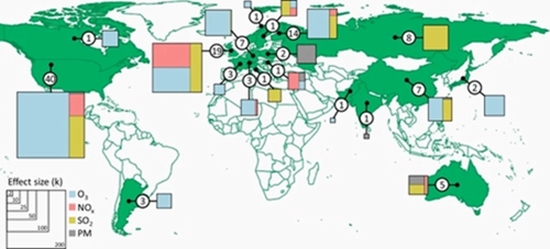Air pollution can impact the environmental and economic benefits of beneficial invertebrates.
Air pollution can impact the environmental and economic benefits of beneficial invertebrates. Original studies have shown that air pollution can disrupt the environmental and economic benefits provided by invertebrates, including pollination and natural pest regulation.

Original studies have shown that air pollution can disrupt the environmental and economic benefits provided by invertebrates, including pollination and natural pest regulation. A global-scale meta-analysis reviewed 120 studies that compared the performance of various invertebrate groups in polluted and non-polluted atmospheric conditions. These studies have focused on pollutants such as ozone, nitrogen oxides, sulfur dioxide, and particulate matter. The studies have demonstrated that the beneficial performance of invertebrates is reduced by air pollution, while the performance of plant pests is not significantly affected. Ozone pollution has shown the most destructive effects. These destructive effects have occurred even at concentrations lower than national and international air quality standards. Changes in invertebrate performance were not related to the concentrations of air pollutants, indicating that even low levels of pollution from these pollutants are harmful. Predicted increases in tropospheric ozone could lead to unintended consequences for global invertebrate populations and their valuable ecological services.
For more information about the current study, please refer to the link below.
https://www.nature.com/articles/s41467-024-49729-5





comment